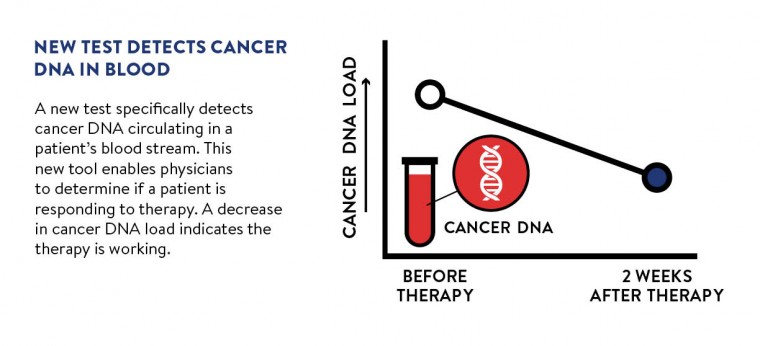Earlier this summer, impressive new clinical data from Chronix Biomedical showed for the first time that a cutting-edge blood test can accurately predict how a cancer patient will respond to treatment.
The test uses a pioneering technology called Next Generation Sequencing to detect fragments of DNA shed by cancer cells into the blood. Using sophisticated laboratory analysis, the test can detect tiny mutations in DNA – the fingerprints of cancer – and show doctors if their treatment regime is effective.
The results presented at this year’s American Society of Clinical Oncology (ASCO) and American Association of Cancer Research (AACR) revealed the test could detect if a patient was responding to chemotherapy and, equally excitingly, modern immunotherapy as early as after the first cycle of treatment.
In recent years, a revolution in cancer therapy has provided doctors with a spectrum of new therapies. But despite major advances, many patients still fail to respond to treatment. The next frontier in personalised cancer medicine is for doctors to know quickly when a treatment is not working so they can move a patient on to an alternative.
Oncologists believe this type of blood test will become an invaluable piece of the cancer treatment puzzle.
Dr Glen J. Weiss, director of clinical research at Cancer Treatment Centers of America at Western in Arizona and principal investigator on both studies, says the results are very encouraging.
“There is potential value in using liquid biopsies to monitor how a patient’s cancer might be changing. Liquid biopsies can be obtained more frequently and might help in the selection of the best possible treatments to combat the cancer. It could be an advantage in helping the patient if results of liquid biopsies give us the ability to know weeks in advance how a cancer is responding to treatment,” he says.
Although a scan can show if a patient is responding to treatment, the latest trial showed the Chronix blood test – a liquid biopsy – provided this information between three and twelve weeks sooner. This can prove pivotal for patients and their oncologists while also helping hospitals to stop spending limited resources on drugs that don’t work.
Oncologists believe this type of blood test will become an invaluable piece of the cancer treatment puzzle
Chronix Biomedical is a pioneer of liquid biopsies and their new Delta Dot Test is the world’s first liquid biopsy to predict the success of immunotherapy in a blinded trial.
The ASCO study, which involved 23 patients suffering from a range of cancers including breast, ovarian, lung, pancreatic and gastrointestinal tumours, quickly showed how each patient was responding to immunotherapy, with 88 per cent accuracy.
The separate AACR study showed equally impressive results in 24 patients with advanced cancer who were receiving chemotherapy.
Justin Stebbing, professor of cancer medicine and medical oncology at Imperial College London and Imperial College Healthcare NHS Trust, says liquid biopsies could deliver significant benefits.
“Liquid biopsies are going to be a major part of our anti-cancer armoury in the future. They will be used for diagnosis, prognosis and most importantly prediction, providing a real-time measure from a simple blood test of how a patient is responding,” he says.
“They also provide enormous scientific and clinical knowledge regarding unique cancer populations, such as stem cells which are rare, but we will hopefully be able to use this to tailor our therapies to our patients, to personalise them, in the future.”
Chronix Biomedical already provides doctors with screening for breast and prostate cancer. Their Second Opinion Test allows clinicians to differentiate between cancer and other prostate conditions, so patients can avoid more invasive needle biopsies.
Their latest blood test analyses fragments of DNA that are shed by tumours into the blood plasma. A doctor takes a 10ml draw of the patient’s blood and the sample is sent to the Chronix laboratory, based in Germany. DNA is extracted from the blood plasma and prepared for sequencing.
The company’s groundbreaking technology can analyse hundreds of millions of DNA sequences in a matter of hours, and identify both the cancer DNA and normal DNA. Within only four days, a unique DNA profile is made for the patient, revealing how they are responding to treatment. Delta Dot provides oncologists with a colour-coded system of red, green or blue dots to indicate when the cancer is still growing, has been destroyed or is mutating.
In the last few years, the mapping of the human genome has enabled scientists to begin building the most detailed picture yet of the molecular changes that fuel cancer growth and allowed researchers to look for ways to interrupt this. While immunotherapy may offer hope for many patients, it remains hard for doctors to know when a patient would do best on traditional chemotherapy or if they should instead be given a newer immunotherapy.
Dr Nick Plowman, senior oncologist at St Bartholomew’s Hospital and The Hospital for Sick Children Great Ormond Street, London, and adviser to the company, says: “Using this technology to detect cell-free DNA circulating in the blood brings a new dimension to testing. The Chronix Delta Dot analysis seems to be leading the field in this regard. Not only can we now know much more quickly as to whether therapy is working, but monitoring for new mutations and implications for early detection of a cancer or its relapse make this the most exciting of research fields.”
A new phase of trials of the Delta Dot analyses is now being rolled out in hospitals across the UK, with further results expected in 2017.
Howard Urnovitz, Chronix Biomedical chief executive, concludes: “We built this test to repeat history. The introduction of a HIV viral load test in 1996 gave medical researchers a target to formulate treatment approaches to stop people from dying of Aids. We believe this Delta Dot cancer DNA load test will lead to a world where no one dies unnecessarily of cancer.”
For more information please visit www.chronixbiomedical.com

